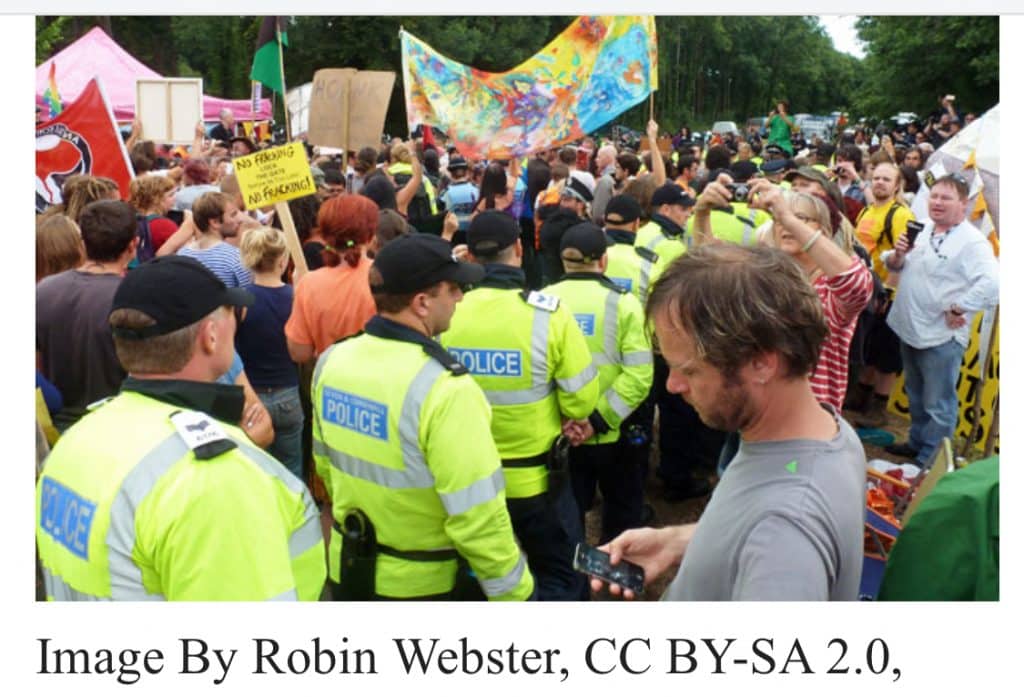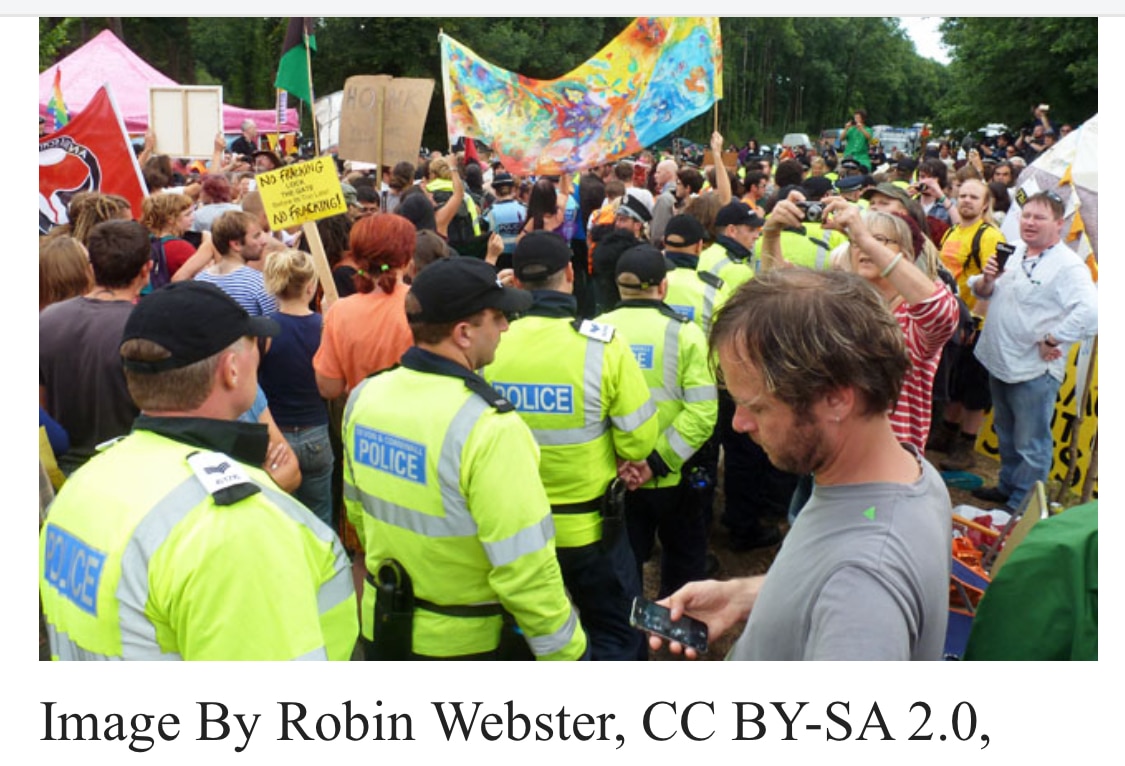Last week it was quietly admitted by the government’s energy minister Kwasi Kwarteng on the BBC’s North West Tonight, that ‘Fracking is over’ and that following the moratorium on fracking last year ‘..the debate’s moved on. It is not something that we’re looking to do’. So, fracking has effectively ended in England (it was already dead in Scotland Wales and Northern Ireland). It ended on the British Isles (as it has in most of Europe) not with a roar, but a whimper. But why exactly did the Tories’ ‘dash for gas’ run out of gas? There are three reasons.
Firstly, and most importantly, the protests. The destructive impacts of fracking in the US, Australia and elsewhere were alerting a large section of the public, tuned in to find out more, that this technology brought nothing but division, environmental destruction and misery wherever it arrived. Hundreds of local opposition groups, sometimes under the banner ‘Frack Off’, sprang up around the country in addition to opposition from traditional environmental groups (Greenpeace, Friends of the Earth) and Greens. Consequently, the government was met with persistent, peaceful protests against fracking in the UK from the day it was first mooted. When protests in the shires united many Conservative, Labour, Liberal Democrat and Green voters against the prospect of polluted water and air, clogged roads, earthquakes, and industrialisation of the countryside the local MPs took fright and lobbied hard to ensure it would not happen anywhere in the South and risk their seats.
The frackers then turned their attention away from the shires to Lancashire and Yorkshire where destruction would be on mainly Labour supporting turf and pursued testing against further brave, dogged protests. These protests had two impacts – they slowed the pace of development and, by having to police test sites, made the whole process more expensive. Secondly, when the tests showed strong seismic activity – tremors and earthquakes – close to where people lived, they were widely publicised through social media and occasionally even on the broadcast news.
In fact, earthquakes were the least of our worries to some extent. Chemical pollution of drinking water, the huge drain on our precarious fresh-water reserves, the need to transport millions of gallons of this fresh water by lorry to the fracking sites along narrow country lanes, and the unsolved riddle of the disposing of more millions of gallons of chemical-laden and sometimes radioactive waste water that is a permanent, toxic by product of fracking were the really frightening prospects.
And that is without mentioning the massive impact of hydraulic fracturing on the climate emergency due to CO2 and methane emissions of ‘unconventional’ drilling for gas and oil. Of the many evils that was the greatest long-term menace, despite a myopic media that parroted the talking points developed by this worst-of-all-worlds industry, especially ‘bridge to renewables’ and ‘energy independence’ – invoking the bogeyman of Russia able to blackmail the country by turning off their gas pipelines (which come nowhere near the UK). This was all nonsense – and the more people researched fracking the less they wanted it.
The frackers employed every PR trick to hide these looming catastrophic impacts from the public and at one point had John Browne (the dark Lord who brought you the Deepwater BP oil disaster and £9,000 tuition fees – no really!) as the Government’s ‘lead Non-Executive Director’ in the Cabinet Office between 2010-14. He appointed placemen Directors to the board of almost every government department ensuring they were all ‘on message’ on the dash for gas. Reports showing destructive impacts were redacted; local councils lost their power to block development and were offered generous bribes to accept drill sites; the media (especially the BBC) were lined up to relay the fracking industry’s sales pitch, paid-for-research by bullshit University researchers. These researchers cherry picked data, ignored mounting evidence of health impacts and environmental ruin in US and Australian states riddled with fracking rigs, downplayed and greenwashed all the horrors this insane technology posed for the cheap price of a juicy research grant and the UK careened towards the cliff with no brake in sight.
But a second, decisive factor then kicked in, the economics of fracking and the falling price of oil and gas. This process was always the most expensive and destructive way of supplying our energy needs, especially as the dramatically falling costs of renewables began to challenge fossil fuels – despite the Tories slashing almost all subsidies and banning new onshore windpower in England. But the tumbling cost of conventional oil and gas meant the US fracking rigs were losing money -and despite the billions invested, the loans and the subsidies they were shutting down across the nation, leaving poisoned fracking waste-water lakes and poisoned water supplies in their wake.
Perhaps ultimately, a third reason saw this government cool to fracking. This was a personal mission of David Cameron who turned his back on ‘all of this green crap’ in 2013. He and his Chancellor George Osbornehas made this their mission and when the wheels started to come off, as it did around our membership of the EU, only one man stood to gain. Boris Johnson’s school boy rivalry with Cameron and Osborne may be the final stake in the heart for fracking – and if it takes a petty, decades old public school feud to cement fracking’s sorry fate, then that is the English way.
Good riddance to bad rubbish and I raise a glass to all the brave protestors who made it happen. Anti-frackers across the country – this is first and foremost your victory. I salute you!

David McQueen












